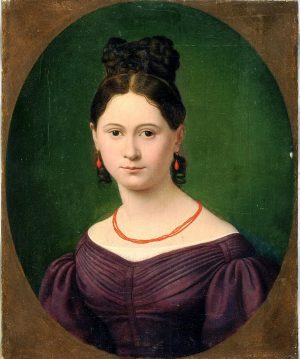Johanna Bertha Julie Jenny Edle von Westphalen was born on the 12th of February, 1814, in the German town of Salzwedel. She was the wife of the political theorist and philosopher Karl Marx. She was a writer, theater critic, and activist.
Family
Jenny von Westphalen was born to an aristocratic Prussian family — her father was Ludwig von Westphalen, and her mother was Amalia Julia Carolina von Westphalen. Ludwig von Westphalen was a senior civil servant in Salzwedel and in Trier, and already had four children from a previous marriage. Jenny’s grandfather on her father’s side was Christian Philip Heinrich von Westphalen, who acted as chief of staff under Duke Ferdinand of Brunswick during the war that included all the powerful nations of Europe. Jenny’s paternal grandmother was a Scottish noblewoman named Jeanie Wishart, whose mother’s family belonged to the Dukes of Argyll, Scotland’s most influential family for centuries. One of Jenny’s brothers, Edgar von Westphalen, was Karl Marx’s schoolmate. Jenny’s other brother, Ferdinand Otto Wilhelm Henning von Westphalen, served as Prussian Interior Minister from 1850 to 1858.
Courtship and Marriage
Jenny von Westphalen was older than Karl Marx by four years. They were already well-acquainted with each other since they were children but became more intimate during their teenage years. Like Marx, Jenny was educated and highly literate, and both were eventually drawn to each other. Marx fell in love with her, believing she was the most beautiful woman in Trier. Jenny’s father, Ludwig, liked the young Marx and enjoyed his company on long walks. They talked about Shakespeare, Homer, Goethe, and philosophy. In 1836, Jenny and Karl became engaged, and they eventually married on the 19th of June 1843 at Saint Paul’s Church in the town of Bad Kreuznach. After the marriage, the couple settled on Rue Vaneau in Paris.
Married Life and Hardships
In 1844, Jenny and her firstborn, Jenny Caroline, went to visit her mother, Amalia Julia. Jenny was pregnant at the time with her next daughter, Jenny Laura. The following year, Karl Marx was expelled by the French government after he and Engels wrote a criticism of the Young Hegelian thought that was prevalent at the time. Jenny was expelled along with Marx, and the two moved to Brussels, Belgium, where Jenny Laura was born. Three years later, the government of Brussels placed Jenny in detention and issued a deportation order against her. She and Karl headed back to Paris, then settled in Cologne, Germany. The Revolutions of 1848 happened, and along with them, the uprisings in the German states. The government ordered Karl Marx to be deported to France. Karl took his wife and children to London, England. The Marx family found a place on Dean Street in London, where they lived for a while. In 1856, Jenny’s mother died, and she left Jenny a sum of money, which enabled her and Karl to move to Grafton Terrace in London. The house had seven rooms, two floors, and a small front yard.
Jenny and Karl had a long marriage, and the two suffered from various forms of tragedy, harassment, and persecution. However, Karl kept on developing his ideas about the oppression of capitalism in spite of all the derision and mockery. In her later years, and despite the uncommon hardships she experienced with her husband, she accepted the life she led with him. Jenny’s youngest daughter, Eleanor, wrote years later that without the help of her courageous mother, her father would not have been able to establish and spread the doctrines of modern communism. Aside from caring for the children, Jenny was always at Karl’s side as his consultant and most intimate supporter.
Death
In her old age, Jenny Marx suffered from various pains and was eventually diagnosed with liver cancer. On the 2nd of December 1881, Jenny died at the age of 67. She was laid to rest at Highgate Cemetery in London. She was disinterred in 1954 and was reburied, along with other members of her family, in the tomb of her husband, which was located in a different area in the same cemetery.
